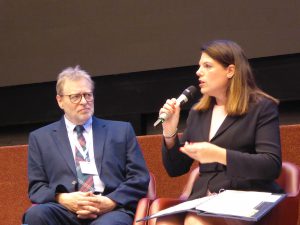On the 1-2 July 2019 we were proud to co-chair the Annual Tripartite Consultations on Resettlement (ATCR) in Geneva. The ATCR is an annual conference bringing together government representatives from resettlement states, NGOs involved in resettlement and the UNHCR over the course of two days to enhance the development and provision of refugee resettlement programmes across the world.
The overall aim of the ATCR is to further the expansion and quality of resettlement programmes by providing a structured forum to share best practice and discuss a wide range of policy and operational issues relating to the development of resettlement programmes. Each year a different country takes responsibility for organising the ATCR in partnership with an NGO co-chair and the UNHCR. We were delighted to be asked by the Home Office to co-chair the ATCR with them this year.
2019 marks an important landmark as it is the 25th ATCR. The anniversary provided an opportunity to celebrate the positive impact that resettlement has had in receiving communities, in host countries and, most importantly, in the lives of more than 1 million refugees resettled since the first ATCR in 1995.
The ATCR was attended by over 300 delegates from more than 30 countries. The event was opened by our Chief Executive, Maurice Wren and Kate Carr, Head of Resettlement at the Home Office. This was followed by opening remarks from Filippo Grandi, High Commissioner for Refugees at the UNHCR and Caroline Nokes, Minister of State for Immigration in the UK.


Each year, the ATCR provides a platform for the launch of the annual UNHCR Projected Global Resettlement Needs report, setting out the resettlement needs across different regions of the world. The findings of the report help frame the discussions over the following days of the ATCR. The report notes that global resettlement needs have doubled in recent years with over 1.4 million refugees now in need of resettlement, whilst the number of resettlement places available has dropped over the same period.
This year also saw the UNHCR launch a new Three-Year Strategy on Resettlement and Complementary Pathways at the ATCR, with much of the ATCR agenda shaped around the goals of the strategy. The two days of the ATCR involved a rich mix of plenary sessions alongside smaller break out groups, providing an opportunity to discuss a range of topics in more detail including building the overall capacity of resettlement programmes and complementary pathways, the specific needs of ‘at risk’ groups, strengthening meaningful refugee participation in resettlement programmes and promoting welcoming societies.
As the NGO co-chair we were particularly keen to increase the number of refugees participating at the ATCR and to ensure their voices as ‘experts by experience’ were front and centre in these important discussions. In January of this year, we worked with partners to establish a ‘Refugee Advisory Group’ of 14 resettled refugees to discuss how they could input into the planning of the ATCR and participate at the event itself. We were then able to bring five members of the group to Geneva to participate in the ATCR. The five members of the Refugee Advisory Group formed part of the largest ever delegation of refugees attending the ATCR. The 2019 ATCR included an important milestone in the form of the first ever Refugee Statement written and delivered by the Refugee Advisory Group as part of the opening remarks. The Refugee Statement proved to be incredibly powerful, both in terms of demonstrating the positive impact resettlement has had on the lives of resettled refugees whilst also acting as a clear ‘call to action’ for all delegates to strengthen their efforts to include refugees in their planning and to increase the number of resettlement places made available.
Following the opening session, the Immigration Minister, Caroline Nokes met with members of the Refugee Advisory Group to hear first-hand their experiences of being resettled to the UK.
At the end of the ATCR, the UNHCR informed us that the inclusion of a Refugee Statement had made ATCR history and that the statement would now become a permanent part of the ATCR in the future. We are incredibly grateful to the UNHCR, the Home Office and all of the refugee participants who contributed towards this important milestone in strengthening the voices of refugees on a global platform.

